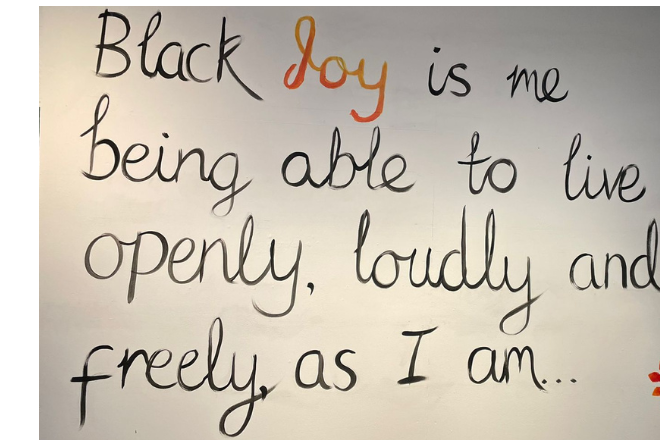
Yesmin is a Co-Production Collective co-producer and a winner of the Coronation Champions Award 2023. She is a community organiser and an East London NHS Foundation Trust Public Governor who works very closely with people from the grassroots. In this blog, she shares her insights into what good patient and public involvement and co-production look like.
Through my lived experiences in working with residents, patients, service users, clinicians, researchers, and minority communities, I have gained a wealth of understanding about how to best engage the public to participate in collaborative projects whatever form they take or whoever they are with. Participation is a multifaceted concept rooted in fundamental aspects of human interaction, engagement, and collaboration. At its core, people's participation is built upon several key principles that reflect the essence of inclusive and meaningful involvement.
Here's some food for thought:
Communication: Communication is when there is an exchange of information, encompassing Non-Verbal, Verbal, Written, and Visual forms. It goes beyond sharing emotions, thoughts, or ideas and of course, this means in languages that are relevant to those participating. Therefore, it is crucial to make sure people are approached using mediums and languages that suit them best, whether it be in person or online, digitally or by sharing hard copies. Inclusive communication allows people to communicate using mediums that are suitable for all to participate, embracing diverse perspectives and ensuring that everyone, regardless of background, identity, or disability feels heard and valued. Active listening is vital to let participants clearly express ideas and cultivate open dialogue. Establishing a space where individuals feel heard and understood is fundamental to effective communication.
Inclusivity: Inclusivity is making sure that everyone is welcome, no matter what their age, gender, ethnicity, capability, sexuality, or religion may be. Encouraging participation from a broad range of voices increases a richer and more comprehensive understanding of issues and promotes a sense of belonging.
Participation: Participation is when someone actively gets involved or takes part in something. It is most meaningful when individuals feel encouraged to explore their capabilities to contribute and make a difference. Supporting people by providing them with the necessary information, and resources to actively engage in the decision-making processes.
Collaboration: Collaboration is equal and equitable distribution of power, inclusivity, and transparency. When people come together to share their strengths, expertise, and ideas, the collective impact is often more significant than individual efforts. Collaboration promotes a sense of unity and shared responsibility. Remember, a wise person once said, “It takes five fingers to make a fist!”
Transparency: Transparency is being open and clear about everything, in other words, not hiding vital information. Building trust and credibility comes with being transparent. Providing clear information about objectives, decision-making processes, and outcomes, promotes a sense of accountability and encourages individuals to actively participate with confidence.
Respect: This was a tough one for me, so I asked my 10 year old daughter who very candidly said, “Respect is being kind to someone, even if you don’t like the way they are.” Hence, Respect involves acknowledging and appreciating diverse opinions, even in disagreement. It is healthy to ‘agree to disagree,’ but disagree with the point and NOT the person. Creating an environment where differing perspectives are respected contributes to a culture of constructive dialogue.
Adaptability: Adaptability is the ability to adjust to something new or different. Recognizing the dynamic nature of human interactions, adaptability is crucial. Systems and processes should be flexible enough to accommodate evolving needs and preferences, ensuring continued and sustained participation over time. Clarifications and adjustments must be a part of the process to accommodate everyone, including the provision of further training if required.
Ownership: Ownership is knowing that ‘it belongs to you.’ Therefore, in a group of participants, this feeling of ‘it belongs to you,’ should be felt by everyone. This is done through delegation. Delegation is part and parcel of ownership which means sharing the tasks so that everyone has a part to play, which then creates ownership with an individual connection to the project. Pushing a sense of ownership introduces a personal investment in the outcomes of collective efforts. When individuals feel a stake in the process and results, they are more likely to actively engage and contribute to the best of their abilities.
Remuneration & Rewards: Remuneration & Rewards are when people are compensated for time, contributions, and skills. This reward can come in many forms, including financial payments, incentives (gift vouchers), or other tangible benefits such as training opportunities, professional development opportunities, public recognition and more. The objective is to acknowledge and value the input of participants in a way that is satisfactory to them. Make sure to remunerate people on time, every time, without a chase! This will build trust and a strong sustainable relationship.
Accessibility: Accessibility is making sure to accommodate everyone in ways that are convenient for them. Some people need venues with ramps, while others need to sit near the microphone/speakers due to wearing hearing aids. It is about making sure people are supported appropriately to participate. Some people need childcare while others may need translators, and so forth. Accessible participation ensures that everyone, regardless of circumstance, can engage meaningfully. Removing barriers and providing equal opportunities for involvement, contribute to a more inclusive and equitable participation framework. It is also, important to communicate without using acronyms to make sure everyone understands what you are talking about.
Refreshments: Refreshments are food and drinks provided by the host at in-person meetings or focus groups. Having refreshments creates a seamless flow while working. It makes people feel comfortable to talk openly over a hot/cold beverage with a content stomach. Providing refreshments that cater to people with specific dietary requirements is vital. Cleary ‘labelling’ food that is set out for consumption is as important including allergy information. Serving hot food on cold days and cold food on hot days is usually a winner. Little adjustments can make big differences for people. (I personally, like fruit platters).
Convenient Venue: The venue is the place where everyone will gather for the event. Providing a suitable and convenient venue (almost) guarantees a great turnout. This means having a venue that is local, easy to find, easily accessible via public transport, and has ramps and lifts for those on wheelchairs or other disabilities. It needs to be clean with easy access to washrooms/toilets.
By weaving these core fundamentals into the fabric of any participatory endeavour, we create a nurturing environment where individuals can express themselves, collaborate effectively, and collectively contribute to positive outcomes.
Cover photo credit:Jon Tyson from Unsplash





.png)

.png)
.png)


.png)
.png)
.png)